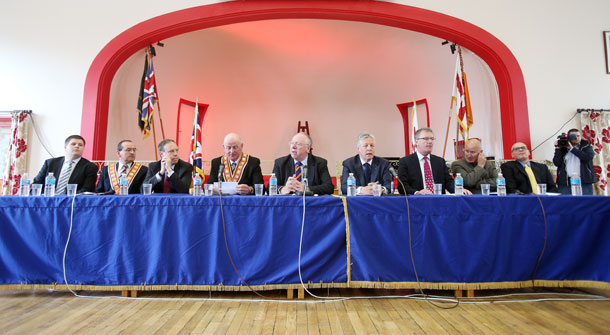22 September 2014
Anti-Agreement axis hollowing out political process

The anti-Agreement axis, including DUP, TUV, UKIP, Orange Order, and unionist paramilitaries.
A LAZY NARRATIVE has gained increased currency over recent months about the political situation in the North. Disagreement on welfare cuts is portrayed as the cause of the current political impasse.
That distracts from any real examination of the serious political situation.
The avoidance of proper analysis was reinforced by two recent public interventions – from Peter Robinson and Charlie Flanagan, the new Irish Foreign Affairs Minister.
The DUP leader asserted the political arrangements set up under the Good Friday Agreement and other Agreements, were no longer fit for purpose, and wants new negotiations.
Charlie Flanagan said there was a failure by parties to deliver basic services.
Both ignored that the political process faces its greatest challenge since the Good Friday Agreement talks in 1998.
DUP leader Peter Robinson’s call for new talks is code for removing the safeguards and protections enshrined by all of the agreements.
The DUP leadership’s position is now completely subordinate to an anti-Agreement axis within unionism.
Irish Government Foreign Minister Charlie Flanagan’s comments ignore that the democratic core of the Good Friday Agreement is now being hollowed out by this anti-Agreement axis, an axis which includes important DUP figures, the TUV, UKIP, others in the Orange Order, and unionist paramilitaries.
The DUP leader asserted the political arrangements set up under the Good Friday Agreement (and other agreements) were no longer fit for purpose. He wants new negotiations. Charlie Flanagan said there was a failure by parties to deliver basic services.
The political landscape is being polarised between pro-Agreement and anti-Agreement positions. Disagreement over welfare cuts is a by-product of that but also reflects an ideological division on socio-economic issues.
Democracy in the North is now under direct threat from the unionist anti-Agreement axis. This reality goes to the heart of the impasse which increasingly exhibits the potential for developing into a full crisis.
There is an urgent need for popular and democratic opinion – along with the Irish, British and US governments – to develop a pro-Agreement axis as a counter to the extremists.
The model and momentum used in the past should become the strategy to empower the positive constituencies which support political stability.
Follow us on Facebook
An Phoblacht on Twitter
Uncomfortable Conversations

An initiative for dialogue
for reconciliation
— — — — — — —
Contributions from key figures in the churches, academia and wider civic society as well as senior republican figures





